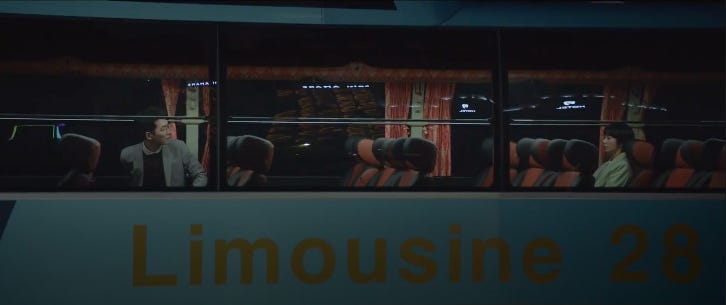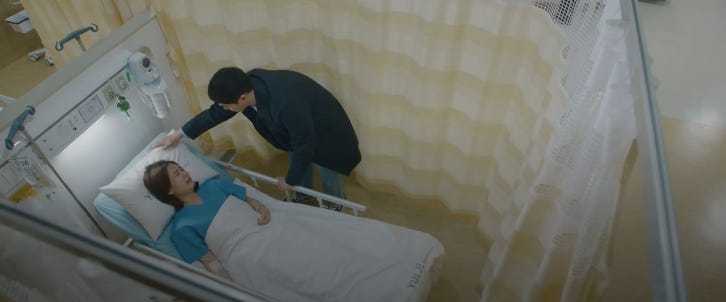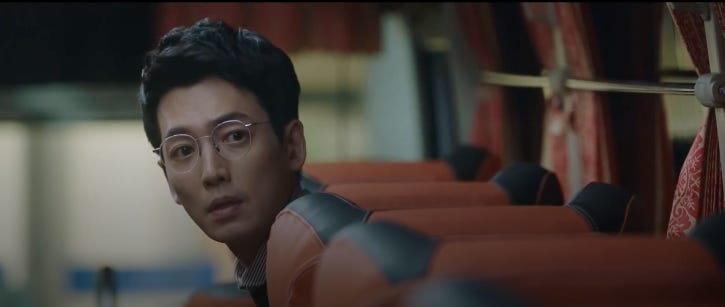Finally… someone comes right out and says it somewhere on the internet… “I don’t understand what Ahn Jeong-won sees in Jang Gyeo-ul and why he would fall for her.” While those of us who root for them might reel at such glaring prejudice , it should be commended for its honesty at least. That sentiment although not as starkly expressed has been a part of Hospital Playlist viewership landscape since S1. It’s one I’ve given much thought to because it does have real philosophical and moral ramifications. And unfortunately it’s just how my brain works. It would be easy to dismiss it in the rough and tumble of internet disputation but I want to revisit this because it is a subject very close to my heart.
On some level I think it’s the wrong question to ask because what the inquirer assumes is firstly, that a fictional character called Ahn Jeong-won should have exactly the same kind of cultural/social/conventional standards for evaluating the suitability of a life partner as the inquirer. It also assumes that there are a set of unspoken universal rules by which people of different cultures and belief systems make important life decisions. There’s seemingly no room for nuance. This is why I think there’s so little civility on social media regarding differences in opinion because we don’t really know what’s motivating people to think the way they do but we insist that we do.
Over the ages, bards and poets have talked about the irrationality or inexplicability of love. “Love looks not with the eyes, but with the mind, And therefore is winged Cupid painted blind.” (A Midsummer Night’s Dream Act 1, Scene 1) It’s undoubtedly easier than to have to explain why X should fall for Y. I don’t know about anyone else but as an explanation, it’s deeply unsatisfying. To me. As someone who reads, watches and writes I can’t accept these platitudes that “the heart wants what the heart wants” without probing further.
There’s an ongoing drama called Nevertheless that’s generating all kinds of controversy about the female lead and her relationships with men. I don’t watch it (the frustration that it causes tells me everything I need to know) but I’ve seen a few clips on YT and I read the comments. What’s relevant to the discussion here is that the same sorts of things are said about her dynamic with the men who have shown interest in her. Guy No. 1 is manipulative and should be avoided like the plague. Guy No. 2 is nicer and he deserves her. Or even she deserves neither. Obviously I’m simplifying it but there are a whole range of views and a lot of nuance in between. It sounds like a bleakly realistic take on modern day twenty-something relationships and I’m not in the frame of mind for it.
When we discuss the romance in our favourite dramas we assume that there’s some agreement about what a healthy or unhealthy relationship looks like. We never think to question or examine our own assumptions. Perhaps it’s just for convenience’s sake or maybe it’s some kind of an appeal to natural law. Obviously on some level we stand on the shoulders of men and women far wiser than we are, who have spent more time thinking about these things and we’re just parroting them.
Have we ever asked ourselves why we look upon recent events concerning bidulgi with such disfavour? Why we root for the bear couple, WG or Ik-Song? I don’t think it’s just about chemistry and hormones surely. Maybe it’s just me and my own tendency to overthink. That’s not to say that people in relationships don’t do irrational things or things that work against their own interests. They do it all the time. But there are reasons and they don’t have to be logical.
I said in my last post that conclusions I came to about Episode 8 helped me to rethink the maggot scene from S1 — if anyone’s forgotten, it’s the scene in which Jang Gyeo-ul walks into the emergency ward, puts on gloves and starts pulling maggots off a homeless man when everyone else is standing around revolted by the sight. In walks Jeong-won and the sight of Ms Not-My-Cup-of-Tea doing her job without murmuring or any expression of disgust is enough to completely overturn his earlier impressions of her. If anyone wants to know what Ahn Jeong-won sees in her, this is it.
Knowing what I now know about Gyeo-ul’s family situation, helps me see the maggot scene on another level. In all probability her stoicism was born out of a difficult growing up environment. How many times would she have had to “clean up” after her parents? She wasn’t without compassion at all but her compassion comes from an entirely different place. A place of hardship. Was she abused too? At this point we can only guess. We talk about compassion almost exclusively as a feeling in general conversation but in Christianity real compassion is thoughtfulness substantiated by actions. She didn’t just imbue the man with a sense of dignity but she showed that she had the potential to be a really great doctor because there was more depth to her than first impressions would suggest.
I think we can give Jeong-won a great deal of credit for his sensitivity and perception as seen in his numerous interactions with patients and guardians. The fact is that he didn’t like Gyeo-ul at first makes him a credible testimonial to her potential. It wasn’t love at first sight on his part but something he saw made him change his mind about her completely. This is the magic of Shin-Lee — to take a well-used trope and do something far more profound with it.
I love the maggot scene so much and I can never move from it because it continues to remind me in some fashion of the parable of The Good Samaritan as told by Jesus who personified compassion. It encapsulates the Christian principle of grace. In fact there’s a reference to the Good Samaritan in the same episode that’s beautifully woven into the tapestry of that episode.
I’ve had the privilege of seeing in person a few of Van Gogh’s paintings in days gone by and I love what he does with colours. These days everyone says he was an artist ahead of his time. In his lifetime the poor fellow never enjoyed the reputation he now has universally. That said, I don’t completely understand why someone would pay millions of dollars for a painting. I have never even seen that kind of money and it is unlikely that I will ever do so. Frankly I can think of better ways to use that sort of dollars. Nevertheless, for some who has deep pockets, paying $82 million USD for The Portrait of Doctor Gachet seems to be worth it for whatever reasons. Worth… apparently is in the eye of the beholder.
These days we’re getting into the nitty gritty of how a number of relationships are playing out. The question of worth has come up again and I think it’s valid because it speaks to effort and longevity. If we were to ask Jun-wan whether Ik-sun is worth it — all the heartache, the misery, the sleepless nights, what do you think he would say in comparison to all the viewers on drama forums and social media? If we asked Ik-jun the same question about Song-hwa who has friendzoned him, does he really need to go that far? Or is it because it just gives him joy to be whatever he can be to her? Does he remember her schedule to the letter and acts as gatekeeper just to earn her affection or is there something else motivating him? Even if she continues saying “no” to him for the next five years, do you think it will change the way he feels about her? What about my favourites, the WG? Do you think Jeong-won is someone who looks just at the surface? Why do you think Shin Hyun-bin who is a beautiful, talented actress is so plainly styled in this drama? Maybe the show is trying to say something about the kind of man Jeong-won is and some other ancillary stuff about books and covers.
Maybe.
Just maybe the show wants to say something different to what we think it should be saying.
Just my 2 cents.






LOVE, LOVE this post! I cannot agree more!
I believe ShinLee deliberately created the role of GU to challenge the stereotypes people have about female medical staff and love interest for an almost perfect male lead, both on personalities and outward appearance. My thought was confirmed during the casting video of Shin Hyunbeen, when they talked about how the character might come across cold / blunt (although a male character with the same personalities may be forgiven); they even titled the video as “not a bad person”.
They also did not try to show her in a good light until the maggot scene either in S1 Ep1 and Ep2 – she was straight forward to the point of being senseless with the guardians. Of course, we saw how upset JW was during their first behind-the-curtain talk; a red herring was even thrown in, I felt, to have JW look at the very pretty Dr. Bae with fondness seeing how well she soothed a mom.
So, naturally, I (and I believe ShinLee as well) expected that some people would not like GU and would not approve of her relationship with JW, especially when they did not straightforwardly talk much about JW's perspectives in S1. What I did not expect was the lack of civility (borrowing your word again, since that sounds much kinder than what I had in mind) in many of the comments I see. It is just unfortunate.
But I totally applaud what ShinLee has done and still doing. I have never gotten so attached to a drama character in my not-so-young life until I found GU in HP, and I definitely fell for her before I fell for the WG ship. And just as I thought knowing and loving about her personalities is enough from S1, ShinLee are now going even deeper with a potentially very complicated and painful background.
As sad and uneasy I have been feeling starting Ep5 knowing that another arc is being developed on GU and WG, this development also shows me how much ShinLee value JW + GU as characters and as a couple (and the same goes for the other couples). Fluffy scenes are sweet, but they are superficial and do not portray a deep / supportive relationship. ShinLee appear to be building up tensions surrounding the “truth” about GU’s family and when it finally boils over and they can finally overcome it, the depth and closeness of their relationship would make their union so much stronger and intimate, much much more than most of the couples in your typical K dramas.
And as the time goes by, I am more and more convinced that whatever GU’s backstory is, it will not be just one-dimensioned; even the most popular suspicion of DV would not be just it. I have heard comments from potential foreshadowing of psychiatry being a featured specialization, GU’s hometown being GZ not being a coincidence, upcoming month of May, etc. There are multiple scenarios that I have come up with in my mind, but of course, they are all just my imagination as a viewer, and I believe the final version from ShinLee would be much more surprising / impactful than my ideas. So, like a broken record, I am super excited to see what is to come, including who would be playing the characters of GU’s parents (I hope we get to see them)!
And to close with a response to the title of your post, I would like to share my interpretation of their handshakes in Ep7: Saying that one has to deserve the other’s love (and vice versa) seems to be viewing relationships as business transactions, where you will only pay the price that matches what you perceive to be of equal value from the other side, and you are assuming that once the purchase is done, the goods / money would not change, or otherwise the deal may need to be called off. And how do you usually close a business transaction meeting? - A handshake just like the first one JW got from GU in his office. But we all know JW is not superficial and he desires a deeper, more intimate partnership – just like how he finally got what he wanted when GU returned the second handshake offer by pressing her palm on his and interlocking their fingers, leaving no room between their hands. While some people may be satisfied with the first handshake when it comes to relationships, I think ShinLee just love GW too much to have them stop there. LOL, I am definitely partial, but I think GW may be ShinLee’s favorite couple😘😁.
*sigh* Thank you for writing this. So good.
When people insist that other people should like only certain people, suitable, safe and deserving, that's a bit like playing with dolls, don't you think? Feelings should be predictable, and relationships smooth, and no-one ever should struggle or make mistakes. That's a bit childish attitude, and life is never going to give you that. Real relationship are always uncomfortable to a certain extent, and as you mentioned previously, negotiation is the key. Can this irrational wish to pair the pairings as a matchmaker would is a reflection that we don't trust love anymore? This makes me sad. And your post made me hopeful ❤️